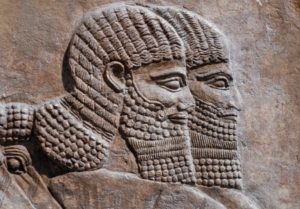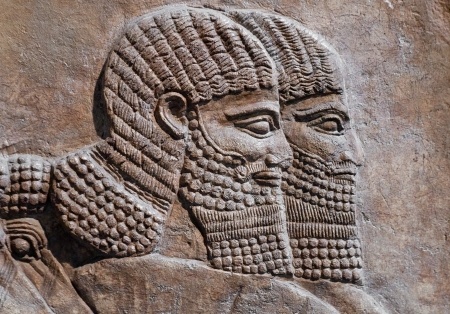
Sometimes the interaction of world history with biblical events can be confusing, as with the reign of Hezekiah, king of Judah. Assyria was the dominant Near Eastern power and Babylon was just an Assyrian vassal state, like Judah. But like a season of the reality TV show, Survivor, a series of alliances were made and then broken when it seemed to be to the advantage of the power brokers of the time—including Hezekiah. Putting the biblical events within their historical context will help in understanding events described in Scripture regarding Hezekiah’s reign.
During the middle period of the Assyrian Empire, the Assyrian king Adad Nirari I (1307-1275 BC), began a policy of deporting large segments of a conquered population to other areas of the empire. This became a standard policy under the Assyrian Empire. “Adad Nirari I decided the best way to prevent any future uprising was to remove the former occupants of the land and replace them with Assyrians.” We see this done in 2 Kings 17: 24 and 18:11, after a later Assyrian king took over Samaria and conquered Israel in 722 BC.
Those who had actively rebelled against the Assyrians were either killed or sold into slavery. But not everyone else was deported; and families were never separated. Those who were deported were carefully selected for their abilities and sent to where their talents were most needed. They were absorbed into the expanding empire and were thought of as Assyrians once they had submitted to central authority.
It was within the later period of the Neo-Assyrian Empire that the events of Hezekiah’s time occurred. Tiglath Pileser III (745-727 BC) revitalized the empire by reorganizing the military and restructuring the governmental bureaucracy. In 2 Kings 16, Ahaz the king of Judah, agreed to become an Assyrian vassal if Tiglath Pileser would take his side against the kings of Syria and Israel, which he did. Under Tiglath Pileser’s reign, the Assyrian army became the most effective military force of the era.
Shalmaneser V was the Assyrian king who conquered Samaria in 722 BC, the same year of his death. His successor, Sargon II (722-705 BC) improved the existing policies and expanded the kingdom even further through his military exploits. Sargon made the mistake in one of his last campaigns against Babylon of sparing the life of the king Merodach-Baladan when he defeated him and his allies in 710 BC.
While he was away on military campaigns, Sargon entrusted his son Sennacherib to maintain the administration of the empire. Because he had been relegated to the role of a governmental official under his father, it seems that when he ascended to the throne, Sennacherib (705-681 BC) was thought to be a potentially weak ruler. He had never gone with his father on campaign and never proved himself in battle. This perceived weakness led others, including Merodach-Baladan and Hezekiah to begin taking stands against him.
Shortly after Sennacherib ascended to the Assyrian throne, Merodach-Baladan returned to Babylon at the head of an army, assassinated the sitting ruler and again took the throne. The first army sent by Sennacherib was easily defeated, so he led a second one in 703 BC, causing Merodach-Baladan to flee the battle field and seek sanctuary in Elam. Merodach-Baladan then attempted to forge another coalition against Sennacherib with Judah, Egypt and other powers in the west of the empire.
Hezekiah became king of Judah in 715 BC after a period of co-regency with his father, Ahaz from 729 BC. As the sole king of Judah, Hezekiah began to make religious reforms, undoing the syncretism that had been practiced by Ahaz. He removed the high places, which had become places of pluralistic worship for Yawveh and other Canaanite gods. He tore down the pillars, and cut down the Asherah poles and broke up the bronze serpent made by Moses into pieces. All these had also become idolatrous objects of worship for the people. 2 Kings 18:5 said there was none who trusted the Lord like Hezekiah among all the kings of Judah—either before or afterwards. These actions of reform seem to have taken place in the earlier days of Hezekiah’s reign, before he rebelled against the king of Assyria.
It seems that while Sennacherib was busy with Merodach-Baladan and Babylon in the east of the Assyrian empire, Hezekiah and others in the west had decided to rebel against Sennacherib as well. Other powers in the area that attempted to throw off the yoke of Assyrian rule shortly after Sennacherib took Babylon included: Tyre and Sidon, as well as the Philistine cities of Ekron and Lachish.
Hezekiah’s revolt (2 Kings 18:7) consisted of withholding his required tribute from Assyria and attempting to extend his regional influence over neighboring territory. 2 Kings 18:8 reports that Hezekiah stuck down the Philistines as far as Gaza. Remember that while not mentioned as such in Scripture, the Philistine city-states were part of the Assyrian Empire. The Assyrian-appointed king of Ekron was taken to Jerusalem in chains and imprisoned by Hezekiah.
Politically, Hezekiah’s expansionist agenda turned out to be a bad idea. In 701 BC, Sennacherib brought his armies into the region to put down the revolts. While Sennacherib himself was busy besieging Lachish, he sent his envoys, including his field commander, to Jerusalem to deal with Hezekiah. They wanted Hezekiah to release the imprisoned king and surrender the city to them. In 2 Kings 18, Hezekiah is reported to have responded to Sennacherib by saying he had done wrong. He released the King of Ekron and vowed to pay whatever tribute Sennacherib imposed if he would withdraw.
But Hezekiah would only sent tribute; he wouldn’t depose himself, as Sennacherib wanted. The chief Assyrian envoy returned to Jerusalem after consulting with Sennacherib and asked whom Hezekiah was relying on for delivery: Egypt? The Lord? Did he think that mere words were enough power and strategy for war? If he was trusting in Egypt to save him, it was a “broken reed of a staff” that would pierce the hand of whomever would lean upon it. Then the Rabahakeh said:
But if you say to me, “We trust in the Lord our God,” is it not he whose high places and altars Hezekiah has removed, saying to Judah and to Jerusalem, “You shall worship before this altar in Jerusalem”? (2 Kings 18:22)
He suggested a wager. He would provide two thousand horses if Hezekiah could provide two thousand riders for them. How could they hope to defeat even one of the Assyrian captains if they were relying upon Egypt for chariots and horsemen? He then claimed it was the Lord who told him to go against Judah and destroy it. Had the gods of any other city delivered them from Assyria?
Then the Rabshakeh proposed that if the people did not listen to Hezekiah, but surrendered to him, they would live and remain with their current property until he returned to take them to another land like their own land. While this negotiation went on, “Lachish was taken and the population slaughtered. Those who were spared were deported to regions in Assyria.”
Hezekiah was required to pay three hundred talents of silver (worth about $4.95 million in today’s currency) and thirty talents of gold (worth about $37.5 million in today’s currency). He stripped the temple of its gold and gave all the silver of the temple and the king’s treasury to Sennacherib. The Assyrian army did withdraw, but only because of an advancing force of Egyptians (2 Kings 19:9) . Sennacherib defeated the Egyptians near the city of Ekron. He then returned to Jerusalem after subduing Ekron, Tyre and Sidon, and resumed the siege. Judah now stood alone against the Assyrians. How had Hezekiah dug himself into such a hole?
About three years before, in 704 BC while Sennacherib was busy subduing the Babylonian rebellion under Merodach-Baladan, Hezekiah became deadly ill. The prophet Isaiah was sent by the Lord to tell him to put his house in order; he was going to die of his illness. But Hezekiah prayed and asked the Lord to remember his faithfulness, how he had “done what is good in your sight.” Then the Lord sent Isaiah back to Hezekiah with another word: the Lord had heard his prayer and granted him another fifteen years of life. Moreover, he would deliver Hezekiah and Jerusalem out of the hand of Sennacherib.
After Merodach-Baladan fled to Elam when Sennacherib defeated him in Babylon, he approached Hezekiah about an alliance to rebel against Sennacherib. Seemingly under the guise of celebrating the good news of Hezekiah’s healing, he sent envoys and presents to Hezekiah. This occurred in 703 BC, shortly before the death of Merodach-Baladan in Elam. Hezekiah stupidly showed the envoys of his new “ally” all that he had—his treasure house; his storehouses; his whole armory. “There was nothing in his house or in all his realm that Hezekiah did not show them” (Isaiah 39:2).
Then Isaiah said to Hezekiah, “Hear the word of the Lord of hosts: Behold, the days are coming, when all that is in your house, and that which your fathers have stored up till this day, shall be carried to Babylon. Nothing shall be left, says the Lord. And some of your own sons, who will come from you, whom you will father, shall be taken away, and they shall be eunuchs in the palace of the king of Babylon.” Then Hezekiah said to Isaiah, “The word of the Lord that you have spoken is good.” For he thought, “There will be peace and security in my days.” (Isaiah 39:5-8)
There was peace from the Babylonians in his days, but he was about to experience the wrath of Sennacherib in two short years.
Hezekiah may have been faithful in doing what was good before the Lord, but he was a terrible leader and politician. It would seem that Hezekiah saw the opportunity of throwing off Assyrian rule as a slam-dunk because of the prophesied protection. But his actions brought the wrath of the most powerful nation of his time down upon him and his people. And it set the stage for the one that replaced it, Babylon, to return and take up where Assyria had to leave off.
Hezekiah prayed once more to the Lord for deliverance and the Lord heard his prayer (Isaiah 37). Again, through the prophet Isaiah, the Lord said: “He shall not come into this city or shoot an arrow there, or come before it with a shield or cast up a siege mound against it. By the way that he came, by the same he shall return, and he shall not come into this city, declares the Lord.” During the night, 185,000 Assyrians were struck down. Sennacherib withdrew to Nineveh and never attempted to take Jerusalem again. In 681 BC, he was assassinated.
The lesson here from Hezekiah is that God doesn’t judge us by what we accomplish in his name; or how successful we are in our lives. Rather, do we trust him with our whole heart? Will we “hold fast” to God—stay close or cling to him in affection and loyalty—as Hezekiah did? What stood Hezekiah apart from all the other kings of Judah was the way he trusted the Lord. In him we see a living embodiment of the truth that would be spoken by Jesus in John 14:14, over 700 years in the future: “If you ask me anything in my name, I will do it.”





